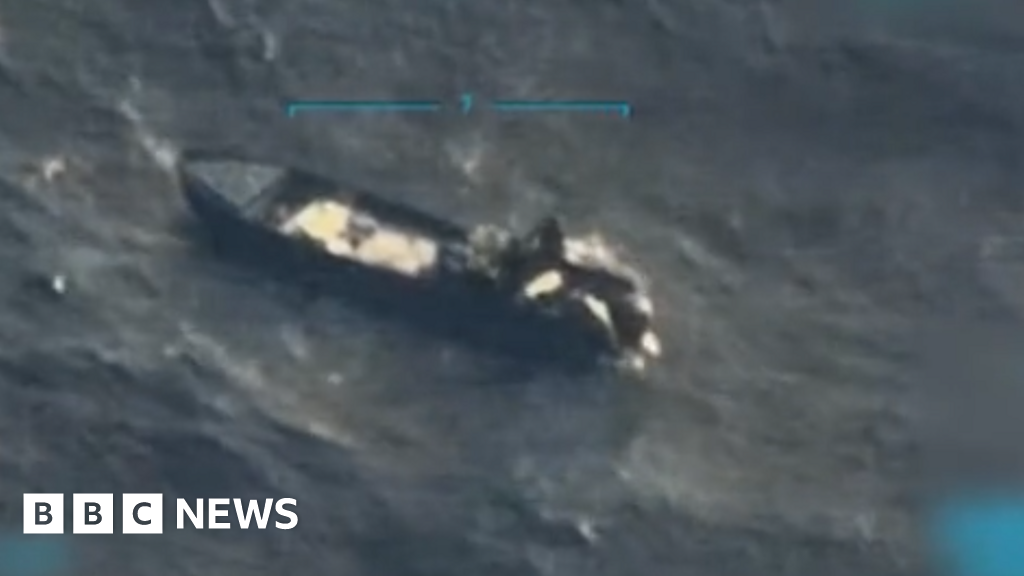
US destroys alleged Venezuelan drug boat, killing three

US Destroys Alleged Venezuelan Drug Boat, Resulting in Three Deaths
In a significant escalation of tensions between the United States and Venezuela, President Donald Trump announced that the US military had destroyed a vessel purportedly involved in drug trafficking. The incident, which took place in international waters, resulted in the deaths of three individuals aboard the boat. This operation was characterized by Trump as a necessary action against “violent drug trafficking cartels” that pose a threat to US national security.
Context of the Incident
On Monday, Trump publicly confirmed the military strike, which he described as a part of ongoing counter-narcotics efforts in the region. The announcement came shortly after Venezuelan President Nicolás Maduro condemned the US actions as acts of aggression. Maduro labeled US Senator Marco Rubio as the “lord of death and war,” reflecting the heightened rhetoric and tensions between the two nations.
The US had previously deployed warships to the southern Caribbean, claiming they were conducting counter-narcotics operations. This deployment was part of a broader strategy that has seen military actions resulting in significant casualties, including an earlier strike that killed 11 people aboard another vessel allegedly linked to drug trafficking.
Details of the Strike
In his statement, Trump emphasized that the military’s actions were aimed at “extraordinarily violent drug trafficking cartels and narcoterrorists.” He shared a video on social media that appeared to show the vessel exploding and subsequently catching fire. However, Trump did not provide any evidence to substantiate his claim that the boat was actively transporting drugs at the time of the attack.
Senator Rubio had defended the initial military action, stating that such operations were necessary to combat drug trafficking and that “some of these boats need to get blown up.” This assertion underscores the aggressive stance taken by US officials against vessels suspected of drug-related activities emanating from Venezuela.
Rising Tensions and Military Posturing
The strike and its aftermath have further strained US-Venezuela relations. When asked about the possibility of conducting strikes on mainland Venezuela, Trump responded ambiguously, indicating that future actions would depend on the evolving situation. He claimed that Venezuela was “sending us their gang members, their drug dealers, and drugs,” suggesting a broader narrative of national security concerns tied to drug trafficking.
In the wake of the first strike, experts raised legal questions regarding the US military’s actions, suggesting they may have violated international law. Venezuela’s response included the deployment of two F-16 fighter jets over a US Navy destroyer, a move that escalated tensions further. Trump subsequently warned that any Venezuelan jets that posed a threat to US forces would be shot down.
Venezuelan Claims and US Response
Tensions escalated again when Venezuelan Foreign Minister Yván Gil accused US forces of boarding a Venezuelan vessel, which he described as a “small, harmless” fishing boat. Gil asserted that the vessel had been seized “illegally and hostilely” for eight hours. The Venezuelan foreign ministry issued a statement suggesting that the seizure was part of a larger US strategy to provoke conflict in the Caribbean, with the ultimate goal of regime change in Caracas.
The US government’s position on Maduro is clear; it, along with several other nations, including the UK, has refused to recognize Maduro’s re-election in July 2024. The US has pointed to evidence suggesting that Maduro’s opponent, Edmundo González, won the election decisively, supported by independent observers. Additionally, US officials have accused Maduro of leading the so-called Cartel of the Suns, a drug trafficking organization, and have placed a $50 million reward for information leading to his capture.
Maduro has consistently denied these allegations, framing US actions as imperialistic attempts to destabilize his government. He has called on Venezuelans to join the militia, a civilian force that has historically been used to bolster support at political events. Reports indicate that public sector workers have faced pressure to enlist in these militias.
Conclusion
The recent military action by the US against the alleged Venezuelan drug boat is a reflection of the escalating tensions between the two nations. As both sides engage in a war of words and military posturing, the situation remains precarious. The implications of these actions could have broader consequences for regional stability and international relations.
Key Facts
– The US military destroyed an alleged Venezuelan drug vessel, resulting in three deaths.
– President Trump described the operation as a strike against violent drug trafficking cartels.
– Venezuelan President Maduro condemned the US actions as aggression and called for defense against it.
– The US has deployed warships to the southern Caribbean for counter-narcotics operations.
– Questions regarding the legality of US military actions have been raised by experts.
– Maduro has been accused by US officials of leading a drug cartel and faces a $50 million reward for his capture.
Source: www.bbc.com
